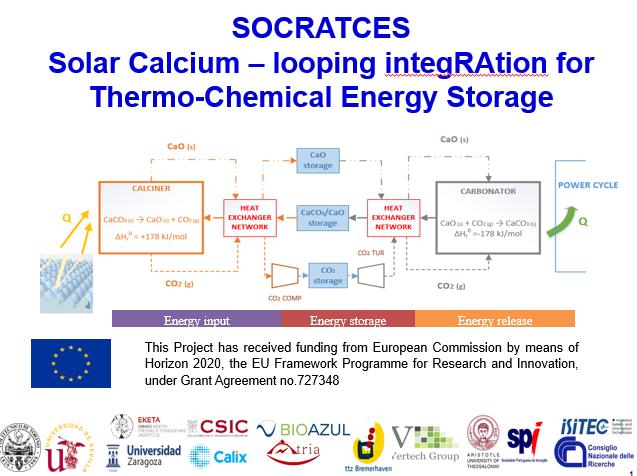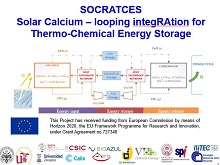Seville, January 16, 2018. A group of researchers from the Institute of Materials Science of Seville (ICMS), part of cicCartuja – a joint CSIC-US-Junta de Andalucía center – will participate in the development of the SOCRATCES project (SOlar Calcium looping integRAtion for Thermochemical Energy Storage). It is funded within the H2020 program of the European Commission with a budget of €4,994,152 and coordinated by the University of Seville.
The SOCRATCES project, with a total duration of 3 years, focuses on the development of a new concept of thermochemical storage of concentrated solar energy -CSP for its acronym in English- through the Calcium-Looping process. This process is based on the reversible reaction of calcination-carbonation of calcium carbonate (CaCO3). Concentrated solar energy is used to carry out the endothermic calcination reaction and the products, calcium oxide (CaO) and CO2, are stored.
Subsequently, to release the energy stored in the chemical bonds, these products are taken to a reactor where the opposite exothermic reaction, carbonation, takes place. This carbonation process releases the energy stored in the bonds, generating heat at a high temperature that can be used to produce electrical energy.
Among the advantages of the system to be developed are the use of limestone as the main material, the high expected performance of the system in its technological maturity stage and the capacity to store energy for long periods of time. Limestone is mainly composed of calcium carbonate (CaCO3), a very low-cost, non-toxic and widely available material, one of the most abundant materials on the planet. The high expected performance of the system is based on the very high energy density of the system and the high temperature attainable in exothermic reactions. Long-term storage is associated with the stability of the bonds in the calcination products.
On January 17 and 18, the kick-off meeting for this project will be held at the University of Seville’s School of Engineering. The consortium that will carry it out is made up of fourteen entities, universities, research centres and companies from seven European countries. The final prototypes of the project will be installed in Seville.
Among the researchers involved in the development of the project are Luis A. Pérez Maqueda, María Jesús Diánez Millán, José Manuel Criado Luque, María Dolores Alba, Pedro Enrique Sánchez Jiménez and Antonio Perejón Pazo, all of them belonging to the ICMS.
Source: University of Seville




